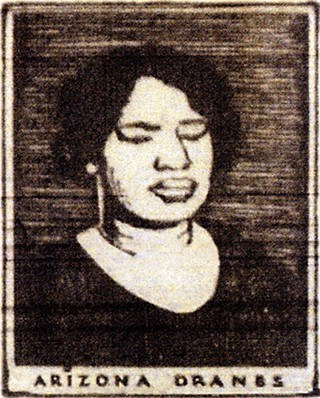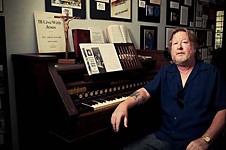Raising Arizona
The first great gospel singer learned her craft in Austin
By Michael Corcoran, Fri., Oct. 26, 2012
"This institution is neither an orphan asylum, a children's home, an asylum for embeciles, nor a hospital, but it is a school for the educable blind and deaf."
When the Institute of Deaf, Dumb and Blind Colored Youths opened in Austin on Oct. 17, 1887 – 125 years ago this month – its 17 pupils and two teachers were hailed as proof that the state had compassion for its most challenged citizens. Located at 4101 Bull Creek Rd., the school bowed with an 11-room residence on 108 acres where the TxDOT complex now sits, then added a two-story brick building the next year.
The state is currently entertaining bids to develop that land, with Stratus Properties having submitted a proposal to build a pair of apartment complexes, two three-story buildings, an H-E-B, and other retail, but in 1887 it was out in the country.
The impetus behind the school's creation was a black state representative from Waller County named William H. Holland, who pushed for a bill to appropriate $50,000 for the land, buildings, and staff. Born into slavery near Marshall in 1841, Holland's freedom was paid for in the 1850s by his white father, Captain Bird Holland, a hero of the Mexican War who later became the Texas secretary of state. The captain sent William, along with his other sons from slaves, Milton and James, to Ohio to be educated.
During the Civil War, the sons fought on the side of the Union, while their father was an officer in the Confederate Army – killed in action in 1864 at the Battle of Mansfield in Louisiana.
After the war, W.H. Holland attended Oberlin College in Ohio. Around 1869, he returned to Texas and became the high school principal in Double Horn (pop. 50), in Burnet County. He joined the Republican Party, which was mostly white, but welcomed black members in that era of Reconstruction, and through that affiliation Holland made his entry into state politics. In 1876, he was elected to the Texas House of Representatives.
Public education of all Texans, regardless of race, was Holland's dominant legislative platform. Citing an amendment to the state's constitution that "[s]eparate schools shall be provided for the white and colored children, and impartial provisions shall be made for both," Holland challenged that since whites had Texas A&M, a similar college should be provided for blacks. As a consequence, the 15th Legislature established the Alta Vista Agricultural and Mechanical College of Texas for Colored Youth in late 1876. Holland's remembered as "The Father of Prairie View A&M," which became the school's name a few years later.
Governor Lawrence Sullivan "Sul" Ross named Holland the first superintendent of Austin's Institute for "colored youths," and he remained there from 1887 to 1897, and then was reappointed from 1904 until his death in 1907.
The most significant graduate in terms of musical influence, gospel pianist and shouter Arizona Dranes, was enrolled in the school as a 7-year-old from Sherman in 1896. During her 16 years there, Dranes was classically trained in piano and voice. According to curriculum records at the Texas State Library, the blind girl, whose parents were both illiterate laborers, tinkered with Mozart and Beethoven as an eight-year-old and was singing arias by age 10.
Dranes was almost certainly sponsored at the blind school, 260 miles away, by Sherman teacher J.W. McKinney, who taught at the Frederick Douglass School, where Dranes would've gone if she wasn't blind. Also the head of the black Masonic Lodge of Texas, McKinney spoke at the blind school's commencement in 1902, the year five students died of pneumonia, urging the enrollees to make full use of whatever gifts God had given them. He ended his speech downplaying the era's racism.
"The fact that you are here, my friends, surrounded by all the comforts and facilities at public expense, these spacious buildings and beautiful grounds furnished for you, gives lie to [the belief that] whites have no regard for the rights of blacks," he said.
Among the teachers Arizona Dranes had was mixed media artist Mattie B. White, who taught students to crochet and weave baskets and rugs. Also an African-American historian credited with popularizing Juneteenth celebrations in East Austin, White taught at the deaf and blind school for 40 years. Dranes' music teachers included Miss M.A. Jackson (1900), Lizzie Wells (1908), and Mabel Scott (1912).
Holland and the school's board of directors believed that playing piano was a good way for the blind to make a living after graduation. Given her mastery of ragtime and barrelhouse, two popular music styles not taught at the school, Dranes picked up secular styles by playing piano at vaudeville shows, nightclubs, and theaters in Sherman from 1912 to 1922.
Four years later, when she was sent to Chicago to record, she played only Christian music. Backing her words of praise with "hot" piano, Dranes is credited with inventing "the gospel beat," giving the genre the rhythmic thrust it's known for today. Before Dranes recorded six songs for OKeh Records on June 17, 1926, almost all recorded religious music was a capella. As the first musical star of the Church of God in Christ, whose fervent, music-fueled services led the church followers to be derided as "holy rollers," Dranes pounded out barrelhouse rhythms without pause.
In another connection to Austin, Dranes was converted to Pentecostalism in 1922 – at age 33 – by preacher J. Austin Love, who grew as up the son of a laborer and teacher at 808 E. 11th. That's next to where Franklin Barbecue now sits. The Rev. Love met Dranes when she joined his growing COGIC congregation in Wichita Falls, where she'd gone to live with a cousin. When the preacher was called to Fort Worth the next year to open the White Street Holiness Church, he took his prized piano-playing parishioner Dranes, whose musical career was launched in Fort Worth.
In 1943, the Institute merged with the State Colored Orphans' Home and was renamed the Texas Blind, Deaf and Orphan School. The school remained on Bull Creek Road until 1961, when it relocated to 601 Airport, the former location of the Montopolis Drive-In Theater. In the late Sixties, black and white blind students were integrated into the Texas School for the Blind and Visually Impaired at 1100 W. 45th.
Five years ago, a web administrator for the TSBVI found enrollment records that placed "Arizona Drane" (the "s" would be added with her musical career) at the blind school as early as 1896. If not for that discovery by Kristi Sprinkle, the early years of this groundbreaking musical talent would remain a mystery, with misinformation passed on that Dranes was a 21-year-old Pentecostal primitive when she recorded the only 16 tracks of hers known to exist, in Chicago from 1926 to 1928.










